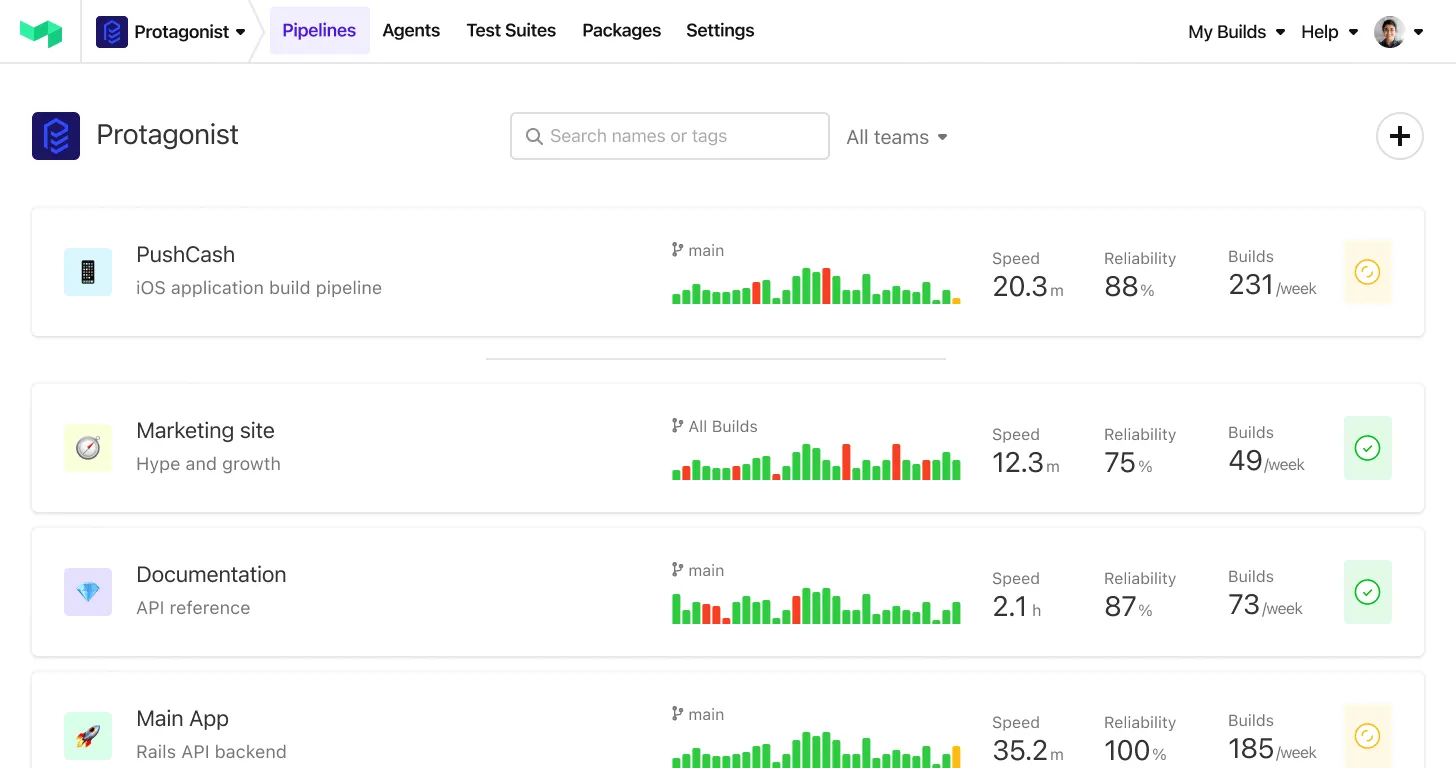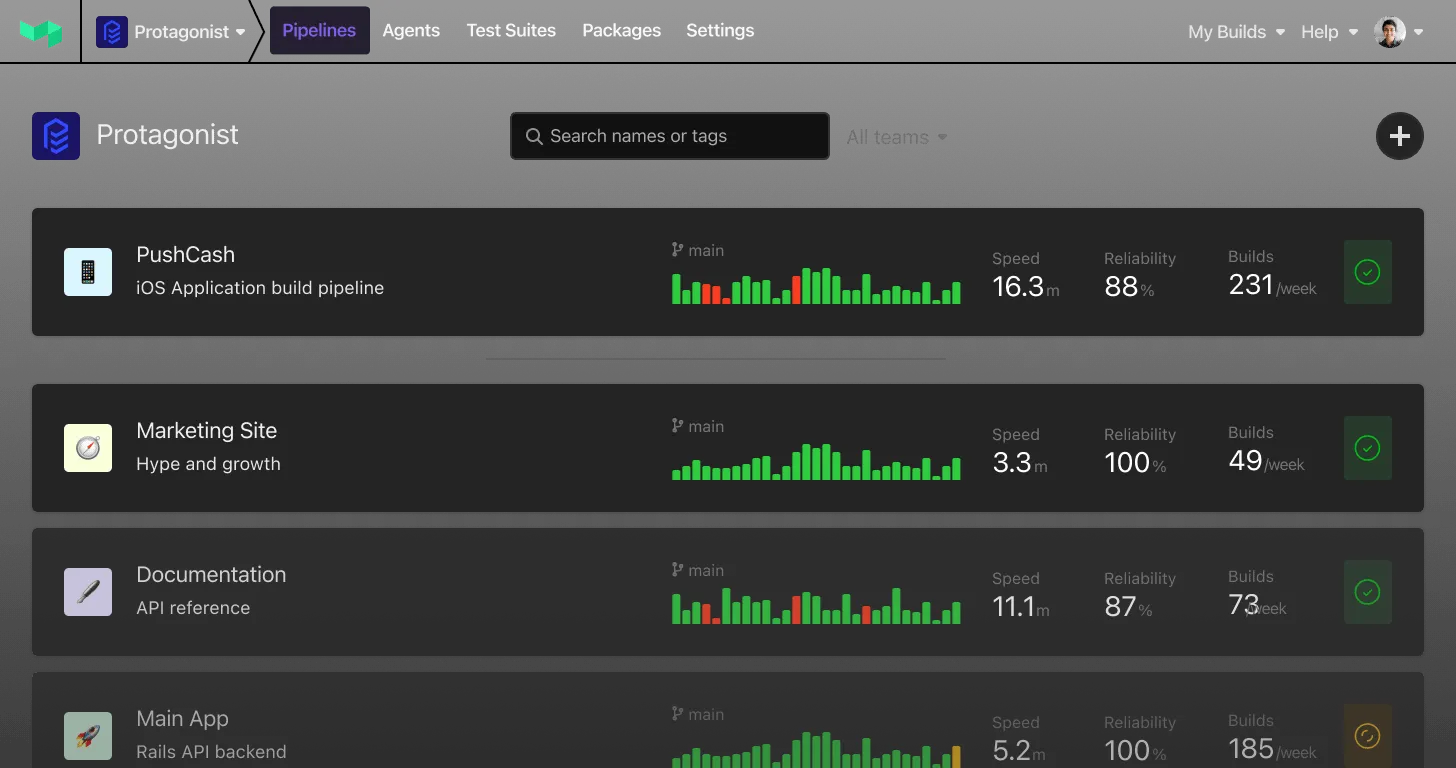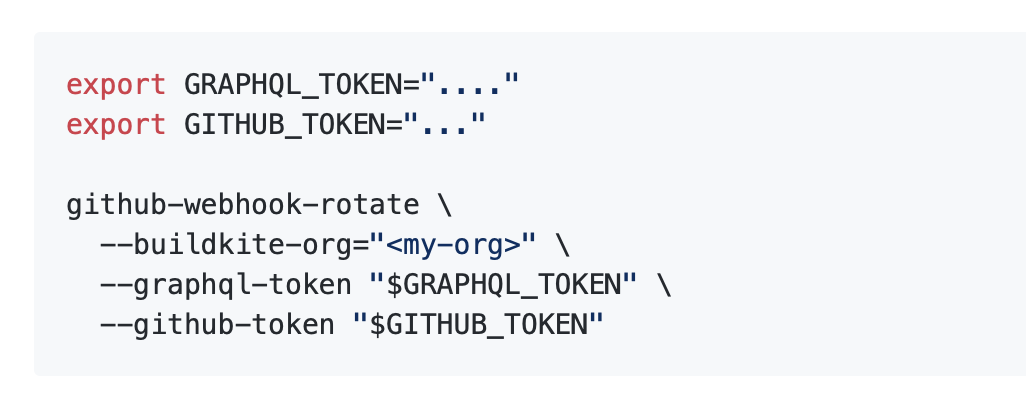Timed out jobs that exit with 0 will now pass
Previously, the build would consider a timed out job as "failed", regardless of its exit status 🙃
This could sometimes happen if a command finished just as the job was being timed out, or if it had specifically implemented signal handling to gracefully exit.
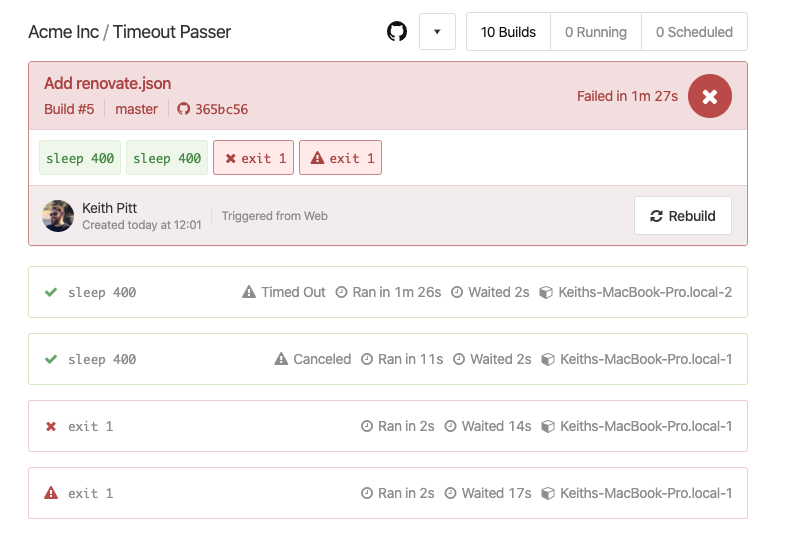
Now, jobs that timeout with an exit status of 0 will be marked as "passed", so you can depend on the exit status as the one source of truth for job status ✅
Harriet
Introducing pipeline step dependencies
We've added support for defining step dependencies in your pipeline configuration, allowing you to minimize the wait times in your builds ⏭
To define a dependency between two steps, you can use the new properties key and depends_on:
1 2 3 4 5 6 7 8 9 10 11steps: - command: "build.sh" key: "build" - command: "tests.sh" key: "tests" - command: "upload-coverage.sh" depends_on: "tests" - command: "deploy.sh" depends_on: - "build" - "tests"
We've also made sure that you can easily transition an existing pipeline to use step dependencies: starting with a sequential pipeline that uses wait steps, you can gradually add depends_on as you need.
For more information about how dependencies work, and how to add them to your pipeline, see the new Managing Step Dependencies guide ✨
Matthew
Embed colored terminal output in Annotations
You can now more easily embed colored terminal output in annotations. 🌈
Wrap any ANSI formatted console output in a Markdown block with either the term or terminal syntax:
1 2 3```term Fancy \x1b[91mc\x1b[33mo\x1b[93ml\x1b[92mo\x1b[94mr\x1b[95ms\x1b[0m here ```
The ANSI formatting is then rendered for you in the annotation:
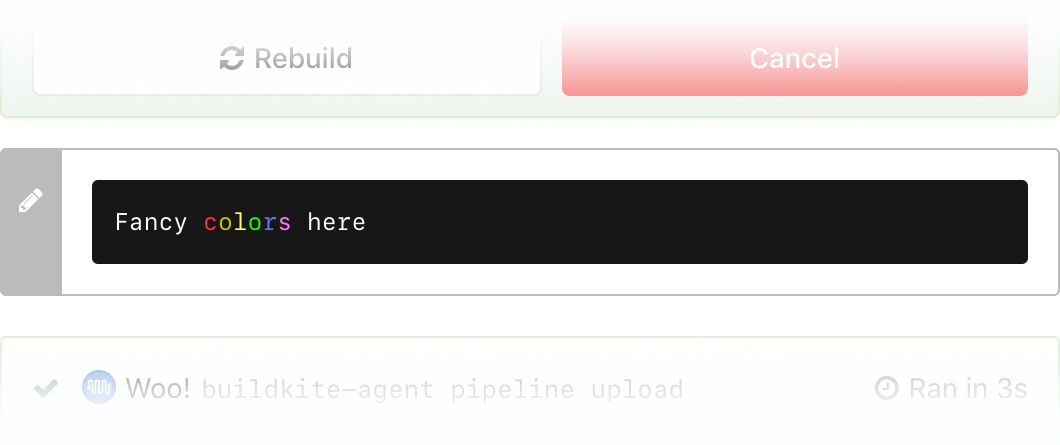
You can read more about the formatting supported in annotations in the CLI docs.
Jessica
Archiving build logs to private S3 buckets
There is a new feature available on our Enterprise plan: you can now choose to archive build logs to your own private S3 bucket, instead of storing them at rest with Buildkite 📦🔐
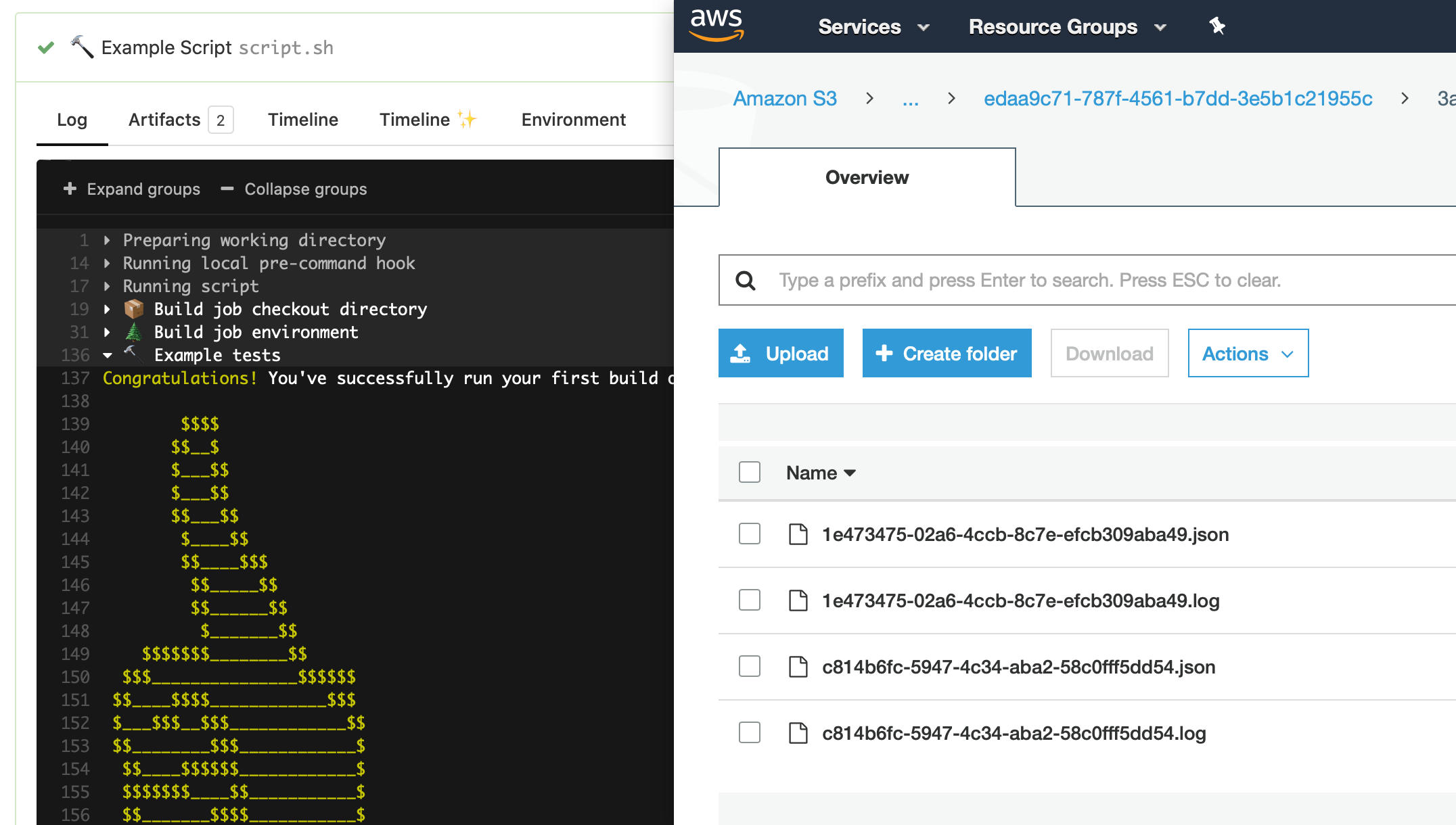
To enable private build log archiving for your organization, or to inquire about upgrading your team to Enterprise, email support@buildkite.com ✉️
Harriet
Date fields in outgoing webhooks now use the correct ISO8601 format
We've rolled out a fix for an issue where dates we presented in Webhooks were using an unusual ISO8601 format. This didn't match the one we document, or the one the REST API returned.
Previously, Webhooks returned dates like this: 2019-08-26 23:03:00 UTC 🙃
They're now consistent with our REST API, and will be returned in the format 2019-08-26T23:03:00.000Z 🎉
Jessica
Access build annotations via the REST API
We’ve added the annotations endpoint to our REST API for retrieving a build’s annotations 🗃
The data is presented as rendered HTML (the same HTML we use within the app) within a JSON body, alongside everything else you might want to know about the annotation.
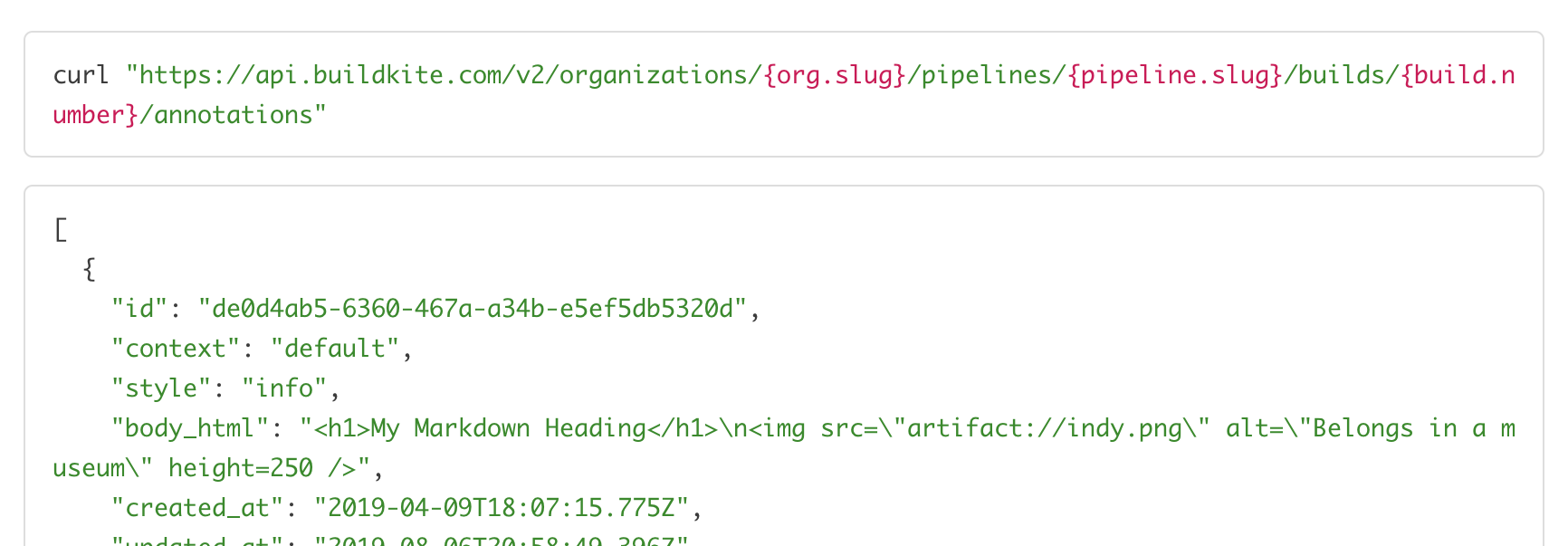
You can read more about this addition in the Annotations API documentation 📖
Jessica
Schedules no longer need a user
Builds created from schedules will no longer be associated with users 🏃🏼♂️💨
If a user loses access to a pipeline, either by leaving the organization or changing teams, you won't need to update your schedules to a new owner.
If your schedule is still attached to a user, you'll see the ⚠️ Requires Migration badge. You'll be able to remove the user from the schedule on the build schedule page.

Unmigrated schedules will have their users automatically removed on the 30th of January, 2020. To check your build schedules, see the Schedules section of your Pipeline Settings 👀
Harriet
Deploying with Buildkite
There’s a whole new section in the docs: ✨Deployments ✨
Here you'll find common patterns for deployments with code samples and walkthroughs, as well as how to add manual approval steps, and working with external deployment systems.
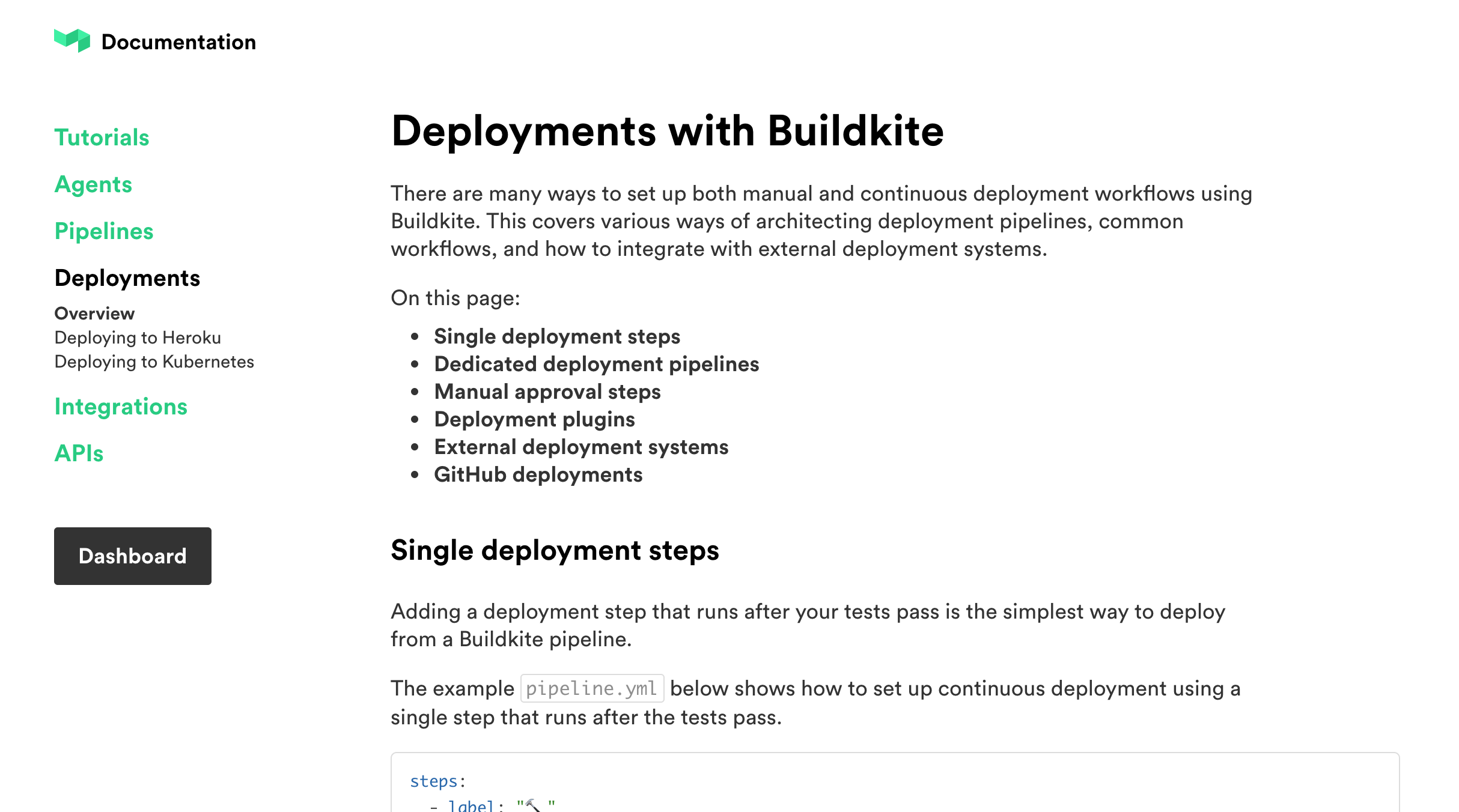
Also new in the deployments section is our guide to Deploying with Kubernetes: a complete walk-through of setting up your Buildkite pipeline to deploy to your Kubernetes cluster 
Check it all out in the new Deployments section 📚
Harriet
New Artifactory support and documentation
We've added new documentation on Buildkite Agent's new Artifactory support for uploading build artifacts to JFrog's Artifactory 🎉
There is now first-class support for uploading your artifacts directly to your Artifactory instance.

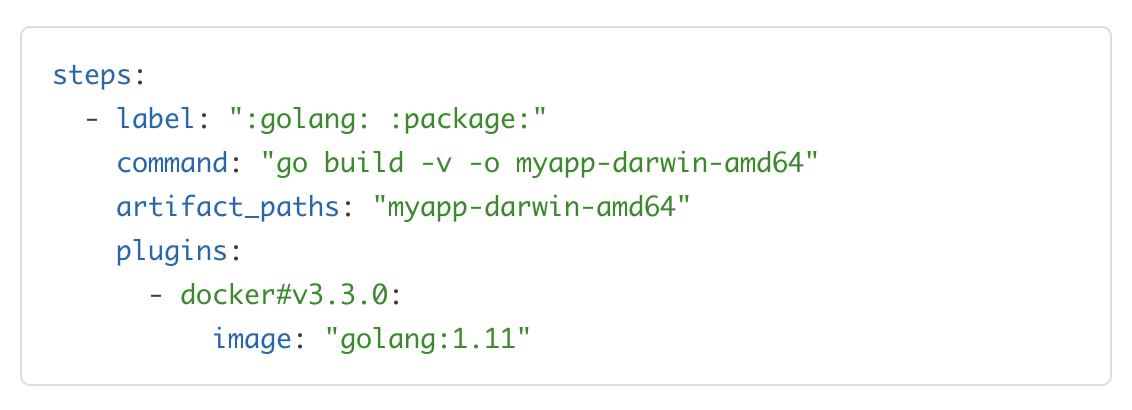
To learn more about Artifactory and our technology partnership, head to the JFrog Partner website. To learn more about Buildkite's built-in Artifactory support, see our new Artifactory guide 👀
Harriet
Conditional expressions for pipeline steps
We've added a new if property that uses a boolean expression to decide whether a step will be run or skipped 💫
You could previously use the branches property to limit the running of a step based on which branch you were building, but this new option allows more complex conditions 😎
1 2 3 4steps: - label: '💨 Smoke Test' command: smoke-test.sh if: "build.branch == 'master' || build.message =~ /\\[smoke\\]/i"

The if property is available on all step types; check out the Using Conditionals
documentation for details!
Matthew
Audit old and unused API tokens with API Access Audit
We've added a new API Access Audit section in your Organization Settings, so you can identify old and unused tokens, and revoke their access to your organization’s data 🕵️
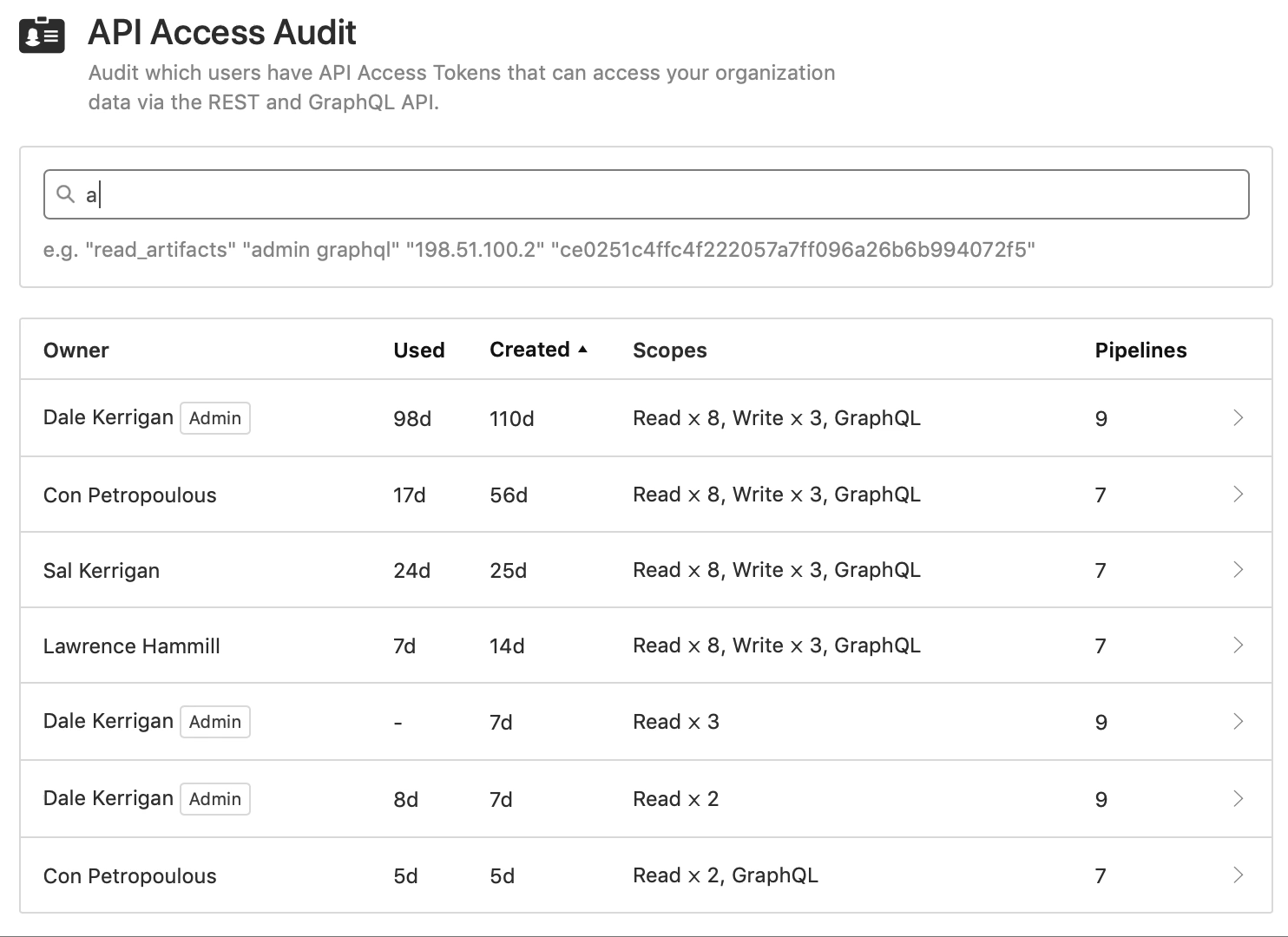
As well as sorting by usage or age, and searching by scope, you can search for the a full token value — allowing you to inspect and revoke a token you've access to.
You can read all about it in the new Managing API Access documentation, and if you’re an organization admin you can find the new API Access Audit section in your Organization Settings.
Eleanor
Buildkite socks now available in the Shop 🧦
The swag you've all been waiting for is finally available in the shop: Buildkite socks 🧦
Our socks are pure cotton and are available in Small, Medium, and Large. Get your hands (or paws🐾) on a pair here: https://shop.buildkite.com/products/socks
Harriet
Identify if you’re running an agent version with known issues
To make it easier to see if you’re running an agent version with a known issue, we've updated the agent list, job timeline, and agent page to show a warning and a link to upgrade instructions 🐛
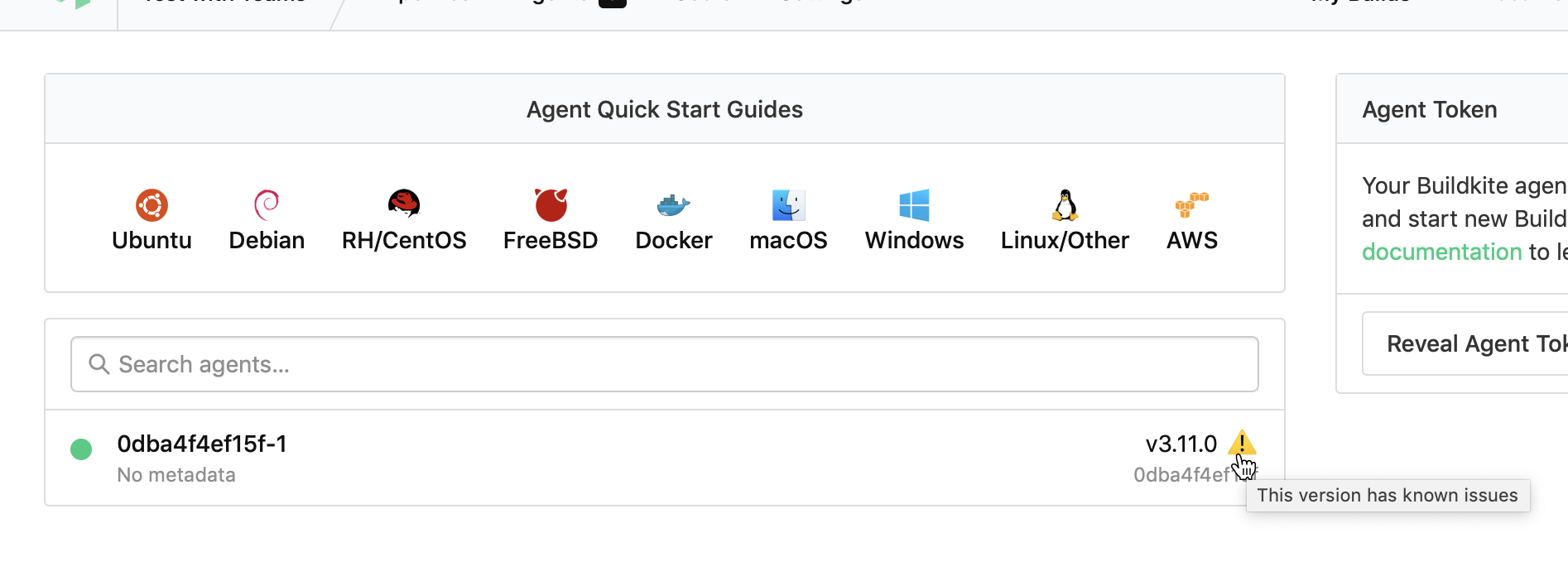
Upgrade instructions all link to their relevant buildkite-agent GitHub release, so you can dig into the details and find the minimum required version bump.
Tim
Configure and manage your single sign-on providers
We've added a new Single Sign-On section to your Buildkite organization settings, allowing you to setup, test, activate and manage your SSO configuration:
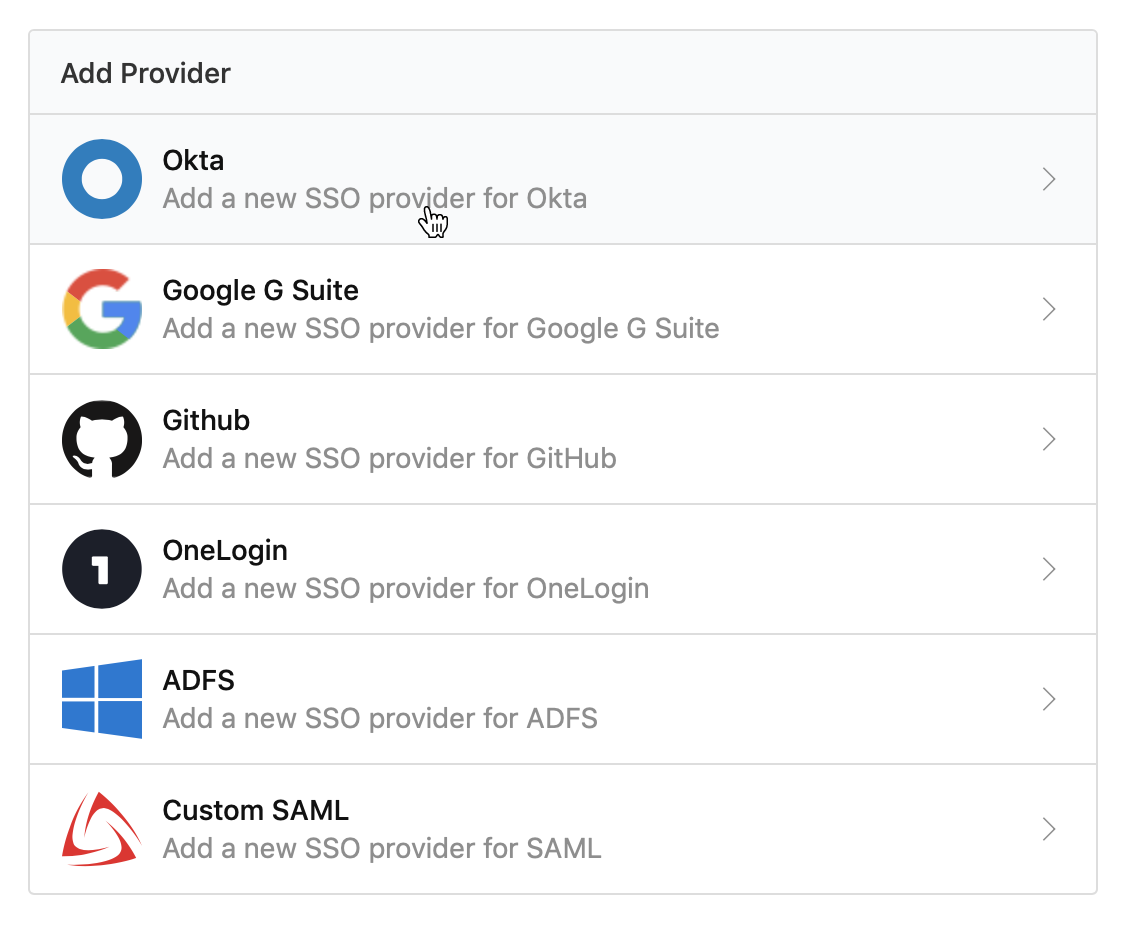
See the SSO documentation for all the details, and how to get started.
Eleanor
Artifacts glob_path and original_path fields are deprecated
The Artifacts API will no longer return the glob_path and original_path fields from 1st September 2019.
When uploading artifacts the Buildkite Agent currently submits information about the glob pattern used to match the artifacts, and where on the filesystem each artifact was stored. We will remove the glob_path and original_path fields from artifacts to reduce the amount of your data we store.

The only place exposing these fields is in the REST API when listing artifacts or retrieving an individual artifact with the Artifacts API. They are not used again by the Buildkite Agent once the artifact is uploaded.
If you rely on this data, please reach out via support@buildkite.com.
Samuel
Scheduled Builds now allow specifying a time zone
We’ve added support for setting the timezone of your Scheduled Builds, so you’re no longer limited to just UTC ⏰

As an added bonus, if you specify a timezone it will automatically handle changes such as daylight savings 🎉
You can read more about the new timezone support in the updated Scheduled Builds documentation.
Jessica
Job navigation now stays on-screen as you scroll
To make it easier to navigate long build pages, we’ve updated the job navigation so that it sticks to the top of your browser window as you scroll 🔝
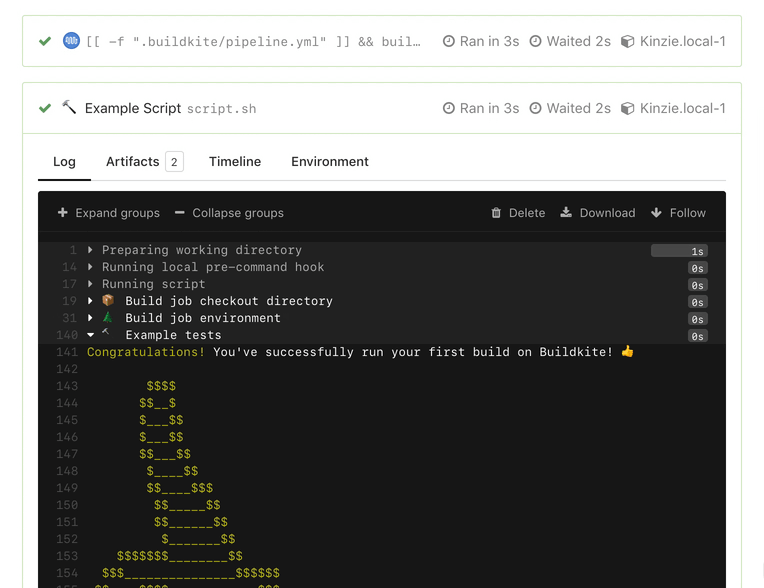
Now you can keep your bearings while spelunking through long build output or tracking down that particular artifact 🔍
Jessica
Link directly to build annotations
We've added the ability to link to build annotations, so you can more easily share them with your team, and link to them in your build output 🔗
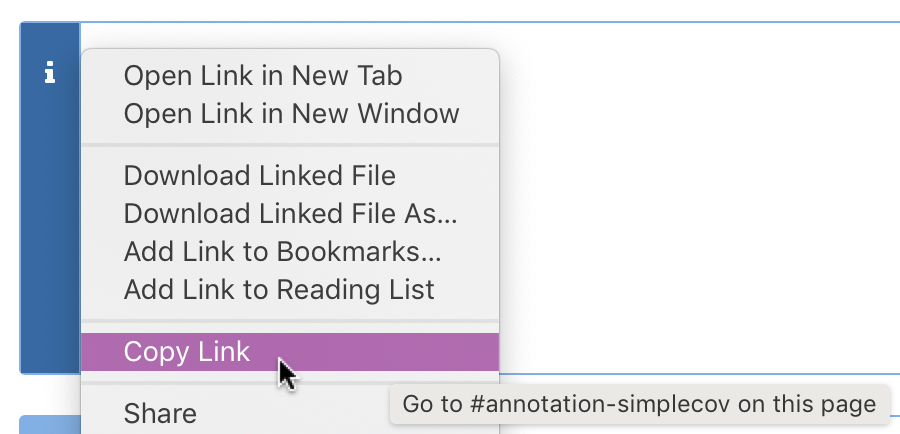
You can find an annotation's link using the coloured bar on the left, or you can add #annotation-<context> to the build page's URL. For example, if the annotation has the context coverage, you'd add #annotation-coverage to the build page's URL.
See the buildkite-agent annotate documentation for information on adding and updating build annotations.
Jessica
Support for rotating pipeline webhook URLs
We've added a pipelineRotateWebhookURL GraphQL mutation for rotating the webhook URL that connects a pipeline with your source control. And a github-webhook-rotate CLI tool for automating the process with GitHub 🌪
You can find the CLI tool on GitHub at buildkite/github-webhook-rotate, and the GraphQL mutation documentation by searching for pipelineRotateWebhookURL in the GraphQL Explorer.
Lachlan
Inspect and revoke API Access Tokens via the REST API
We've added a new set of REST APIs for managing an API Access Token, including the ability to immediately revoke the current token 🗑
See the API Access Token REST API documentation for more details.
Tim
Start turning complexity into an advantage
Create an account to get started with a 30-day free trial. No credit card required.
